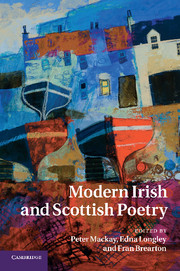Book contents
- Frontmatter
- Contents
- List of contributors
- Acknowledgements
- Introduction
- 1 Swordsmen: W. B. Yeats and Hugh MacDiarmid
- 2 Tradition and the individual editor: Professor Grierson, modernism and national poetics
- 3 Louis MacNeice among the islands
- 4 Townland, desert, cave: Irish and Scottish Second World War poetry
- 5 Affinities in time and space: reading the Gaelic poetry of Ireland and Scotland
- 6 Contemporary affinities
- 7 The Classics in modern Scottish and Irish poetry
- 8 Translating Beowulf: Edwin Morgan and Seamus Heaney
- 9 Reading in the gutters
- 10 ‘What matters is the yeast’: ‘foreignising’ Gaelic poetry
- 11 Outside English: Irish and Scottish poets in the East
- 12 Names for nameless things: the poetics of place names
- 13 Desire lines: mapping the city in contemporary Belfast and Glasgow poetry
- 14 ‘The ugly burds without wings’?: reactions to tradition since the 1960s
- 15 ‘And cannot say / and cannot say’: Richard Price, Randolph Healy and the dialogue of the deaf
- 16 On ‘The Friendship of Young Poets’: Douglas Dunn, Michael Longley and Derek Mahon
- 17 ‘No misprints in this work’: the poetic ‘translations’ of Medbh McGuckian and Frank Kuppner
- 18 Phoenix or dead crow? Irish and Scottish poetry magazines, 1945–2000
- 19 Outwith the Pale: Irish–Scottish studies as an act of translation
- Guide to further reading
- Index
- References
7 - The Classics in modern Scottish and Irish poetry
Published online by Cambridge University Press: 18 April 2011
- Frontmatter
- Contents
- List of contributors
- Acknowledgements
- Introduction
- 1 Swordsmen: W. B. Yeats and Hugh MacDiarmid
- 2 Tradition and the individual editor: Professor Grierson, modernism and national poetics
- 3 Louis MacNeice among the islands
- 4 Townland, desert, cave: Irish and Scottish Second World War poetry
- 5 Affinities in time and space: reading the Gaelic poetry of Ireland and Scotland
- 6 Contemporary affinities
- 7 The Classics in modern Scottish and Irish poetry
- 8 Translating Beowulf: Edwin Morgan and Seamus Heaney
- 9 Reading in the gutters
- 10 ‘What matters is the yeast’: ‘foreignising’ Gaelic poetry
- 11 Outside English: Irish and Scottish poets in the East
- 12 Names for nameless things: the poetics of place names
- 13 Desire lines: mapping the city in contemporary Belfast and Glasgow poetry
- 14 ‘The ugly burds without wings’?: reactions to tradition since the 1960s
- 15 ‘And cannot say / and cannot say’: Richard Price, Randolph Healy and the dialogue of the deaf
- 16 On ‘The Friendship of Young Poets’: Douglas Dunn, Michael Longley and Derek Mahon
- 17 ‘No misprints in this work’: the poetic ‘translations’ of Medbh McGuckian and Frank Kuppner
- 18 Phoenix or dead crow? Irish and Scottish poetry magazines, 1945–2000
- 19 Outwith the Pale: Irish–Scottish studies as an act of translation
- Guide to further reading
- Index
- References
Summary
Latin is the most ancient literary language of Ireland, Scotland and England, but usually it has been extirpated by general anthologists of Scottish, English or Irish poetry. Exceptionally, Hugh MacDiarmid included a few English prose versions of Scottish Latin poems in his 1940 Golden Treasury of Scottish Poetry, but almost six decades would pass before Thomas Owen Clancy's more specialised landmark medieval anthology The Triumph Tree (1998) reminded modern Scots through translation that they, too, inherited a multilingual trove of ancient poetry linking them to Europe, not just to ancient Scotland or the British Isles. For all that they printed work only in modern English translation and omitted the original poems, the wish of Clancy to call attention to a fully multilingual past was salutary.
Yet there were also signs among anthologists in Ireland and Scotland of nationalist anxiety about origins. In Ireland the 1991 Field Day anthology may be structured historically, but its first section, entitled ‘Early and Middle Irish Literature’ (c. 600–c. 1600), occupies a chronological space that begins not before but after the period covered by the second section, ‘Latin Writing in Ireland’ (c. 400–c. 1200). The historical course of the anthology seems skewed so as to position native Irish – The Táin – ahead of the more cosmopolitan Latin – the confession of St Patrick – as the foundational language of Irish writing.
- Type
- Chapter
- Information
- Modern Irish and Scottish Poetry , pp. 131 - 146Publisher: Cambridge University PressPrint publication year: 2011
References
- 1
- Cited by



